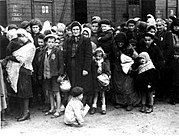Nuremberg trials
| Part of a series on |
| The Holocaust |
|---|
 |
The Nuremberg trials (German: die Nürnberger Prozesse) were a series of military tribunals, held by the Allied forces after World War II, which were most notable for the prosecution of prominent members of the political, military, and economic leadership of Nazi Germany who planned, carried out, or otherwise participated in The Holocaust and other war crimes. The trials were held in the city of Nuremberg, Germany.
The first, and best known of these trials, described as "the greatest trial in history" by Norman Birkett, one of the British judges who presided over it,[1] was the trial of the major war criminals before the International Military Tribunal (IMT). Held between 20 November 1945 and 1 October 1946,[2] the Tribunal was given the task of trying 23 of the most important political and military leaders of the Third Reich, though one of the defendants, Martin Bormann, was tried in absentia, while another, Robert Ley, committed suicide within a week of the trial's commencement.
Not included were Adolf Hitler, Heinrich Himmler, and Joseph Goebbels, all of whom had committed suicide in the spring of 1945, well before the indictment was signed.[3]
The second set of trials of lesser war criminals was conducted under Control Council Law No. 10 at the U.S. Nuremberg Military Tribunals (NMT), which included the Doctors' Trial and the Judges' Trial. This article primarily deals with the IMT; see Subsequent Nuremberg Trials for details on the NMT (the second set of trials).
International Military Tribunal for the Far East
The International Military Tribunal for the Far East (IMTFE), also known as the Tokyo Trials, the Tokyo War Crimes Tribunal, or simply the Tribunal, was convened on April 29, 1946, to try the leaders of the Empire of Japan for three types of war crimes. "Class A" crimes were reserved for those who participated in a joint conspiracy to start and wage war, and were brought against those in the highest decision-making bodies; "Class B" crimes were reserved for those who committed "conventional" atrocities or crimes against humanity; "Class C" crimes were reserved for those in "the planning, ordering, authorization, or failure to prevent such transgressions at higher levels in the command structure".[citation needed]
Twenty-eight Japanese military and political leaders were charged with waging aggressive war and with responsibility for conventional war crimes. More than 5,700 lower-ranking personnel were charged with conventional war crimes in separate trials convened by Australia, China, France, The Netherlands, thePhilippines, the United Kingdom and the United States. The charges covered a wide range of crimes including prisoner abuse, rape, sexual slavery, torture, ill-treatment of labourers, execution without trial and inhumane medical experiments. China held 13 tribunals, resulting in 504 convictions and 149 executions.
The Japanese Emperor Hirohito and all members of the imperial family, such as career officer Prince Yasuhiko Asaka, were not prosecuted for involvement in any of the three categories of crimes. Herbert Bix explained, "the Truman administration and General MacArthur both believed the occupation reforms would be implemented smoothly if they used Hirohito to legitimise their changes".[1] As many as 50 suspects, such asNobusuke Kishi, who later became Prime Minister, and Yoshisuke Aikawa, head of Nissan, were charged but released in 1947 and 1948. Shiro Ishii received immunity in exchange for data gathered from his experiments on live prisoners. The lone dissenting judge to exonerate all indictees was Indian jurist Radhabinod Pal.
The tribunal was adjourned on November 12, 1948.
'연구하는 인생 > Histrory' 카테고리의 다른 글
| Origin of the Korean War 1950 (0) | 2016.11.18 |
|---|---|
| * TIMELINES OF WORLD HISTORY (0) | 2016.04.19 |
| 세계역사의 시대적 구분 (0) | 2016.04.01 |
| The French and Indian War (0) | 2016.03.13 |
| French and Indian Wars (0) | 2016.03.13 |
